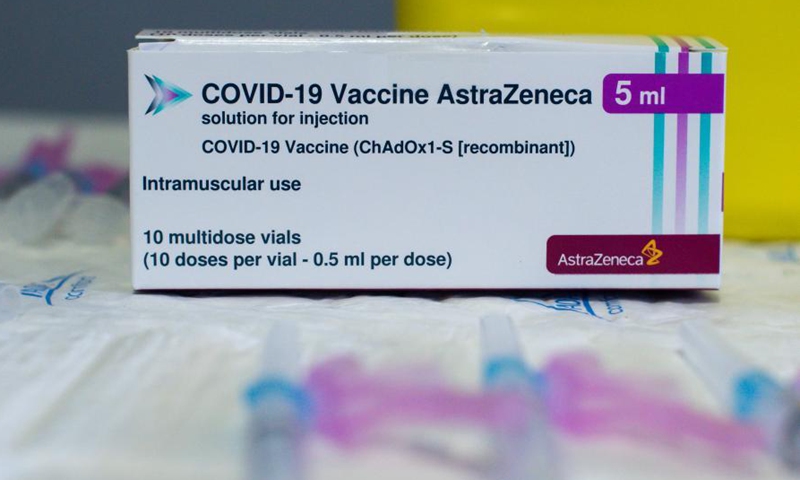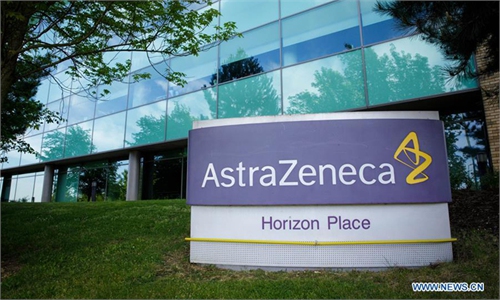Europe advised to expand vaccine procurement to Chinese doses after halt of AstraZeneca amid blood clot concern

Photo taken on March 12, 2021 shows AstraZeneca/Oxford vaccines at a hospital in Caceres province in Spain.Photo:Xinhua
After some 15 European countries halted the AstraZeneca COVID-19 vaccine over blood clot concerns, some experts said the World Health Organization (WHO) and related organs should also temporarily suspend the distribution of the AstraZeneca vaccine through the COVAX vaccine-sharing initiative, and issue an inoculation warning to all countries that use the shots.As the suspension has made things worse for Europe which is already suffering from a shortage of vaccines, Chinese analysts suggested Western pharmaceutical companies such as the France-based Sanofi to apply for authorization from Chinese vaccine developers to stock the vaccines for Europe.
Germany, France, Italy and Spain on Monday became the latest European countries to suspend the rollout of the Oxford-AstraZeneca vaccine after reports that some inoculated people died due to blood clots after taking doses of the vaccine. At least 15 European countries temporarily halted the vaccine.
German health minister Jens Spahn said on Monday that the country would pause inoculations as a precaution, and France and Italy also halted their rollouts of the vaccine Monday, pending a review by the EU's medicines regulator, the European Medicines Agency (EMA), CNN reported on Tuesday.
The EMA said there is no indication that the AstraZeneca vaccines are the cause of reported blood clots and it is firmly convinced the benefit of the shots outweighs risks, BBC reported Tuesday.
The WHO is also investigating the cases. In a statement the WHO sent to the Global Times on Tuesday, it said "We're investigating the reports and working closely with the European Medicines Agency. As soon as we have a clearer picture we'll inform the public of [the] findings."
The AstraZeneca COVID-19 vaccine was given WHO Emergency Use Listing in February, and then on February 25, UNICEF signed a COVID-19 vaccine supply agreement with AstraZeneca which enabled access to 170 million doses secured under the COVAX for around 85 countries.
Ghana was the first country to receive COVID-19 vaccines through COVAX and received 600,000 doses of the AstraZeneca vaccine, according to the BBC.
A Beijing-based immunologist who asked for anonymity told the Global Times on Tuesday that blood clots are a very rare adverse reaction for vaccines, and so far there is no clear evidence of whether the vaccine is related to blood clots.
But it is possible that some batches of the AstraZeneca vaccine may have failed adequate quality control in production as manufacturing techniques of the adenovirus vector vaccine are not mature enough compared with inactivated vaccines, the immunologist said.
He suggested that the WHO issue a notice advising all countries using the AstraZeneca vaccine to be cautious, and that distribution of the vaccine through COVAX should be suspended until after the investigation.
Over 40 countries have purchased the Oxford-AstraZeneca vaccine as of March 12, according to a Global Times calculation of vaccine contracts tracked by Duke Global Health Innovation Center.
Tao Lina, a Shanghai-based vaccine expert, believes that incidents of blood clots are rare and that reports in several European countries may just be a coincidence, rather than directly related to the vaccine.
As for why most such adverse reactions were reported in Europe, Tao said that it needs further study to see whether climate or environment may have a connection.
The suspension provides an opportunity for more European countries to think about other vaccine options such as China-produced vaccines that were not introduced due to ideological bias.
French politician Jean-Luc Mélenchon said on Monday that France should stock up on vaccines, and that only Pfizer and Moderna vaccines are not enough.
The EU has only approved the Pfizer, Moderna and AstraZeneca vaccines. But rollouts have been hampered by delivery delays, production bottlenecks and political blunders, Al Jazeera reported.
Mélenchon said that he would bring in Cuban or Chinese vaccines. "We must not make ideology when it comes to vaccines. You have to go to them and ask them if they can produce them in France," he said, according to Huffington Post.
The anonymous immunologist said that Europe should take this time to carefully assess all the available COVID-19 vaccines worldwide to expand its vaccine list to include the safe inactivated Chinese vaccine, so that emergencies like this can be avoided in the future.
"Aside from purchasing Chinese vaccines directly, Europe could allow the West's major pharmaceutical companies such as Sanofi to apply for authorization of Sinopharm or Sinovac to produce Chinese vaccines which will be more convenient and cost-effective," the immunologist said.
Serbia will become the first European country to produce the Chinese Sinopharm coronavirus vaccine, President Aleksandar Vucic said last week, AFP reported.
Vucic said that a deal concerning the construction of a "vaccine factory" will be signed in the next two weeks, and Serbia will provide the vaccine to countries throughout the region.


